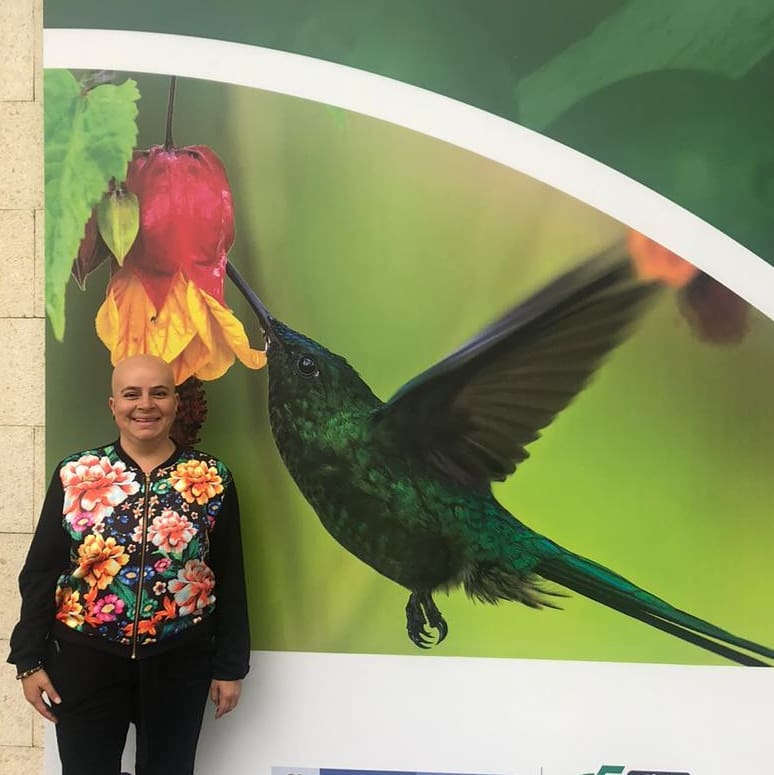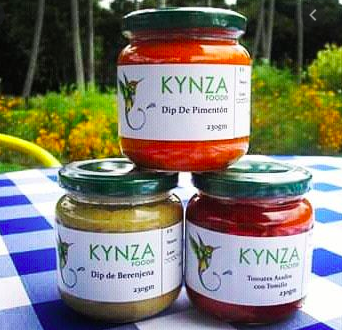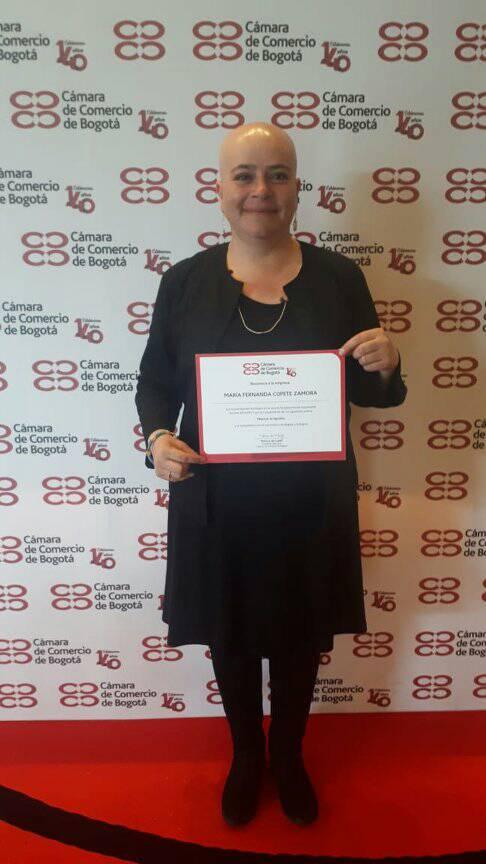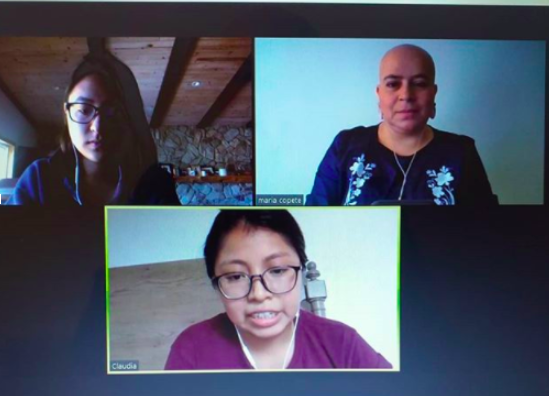Maria Fernanda Copete Zamora is a determined and feisty Colombian woman that has turned her own discriminatory experiences into an entirely new career — one that feeds the soul and people.
As a child, Maria was always outdoors, surrounded by unique experiences that altogether drew her to food. Ever since she was small and growing up in Bogotá, Maria loved to eat, smell, taste, and feel the flavor of foods. Her childhood vacations were visits to her grandparents’ farm, where she harvested fruit and took beautiful walks through the countryside. There she first learned about growing fruit trees, coffee production, and the beauty of the outdoor world.
After growing up living in Bogotá, Colombia, she became the mother of two children, David and Ana Catalina.
However, Maria struggled with supporting her family and finding a fulfilling occupation. Maria faced frustrating discrimination in various work enviromentes because of her alopecia, or loss of hair. “Scarring partial alopecia was a determining factor for me when creating the company, due to the few opportunities for job inclusion caused by this pathology.” Maria described how her alopecia blocked her from chances she wished she could have taken. “Although alopecia is an aesthetic disability, it is not easily incorporated into workplaces.”

Unfortunately, this stigma led her to develop depression, which further complicated her struggle to find a career that would also support her loved ones. She learned about the processes of urban agriculture as a therapeutic method to treat the depression caused by her condition, the contact with the farmers led her to represent and train various communities in urban agriculture, when she frequented urban farmers markets in Bogotá, she would chat with producers and learn about the marketing dynamics that allowed her to open a new path. “Knowing the processes of urban agriculture as a therapeutic method to treat depression caused by alopecia led me to create Kynza Food.”
She saw how important the growth of food was and enjoyed speaking to the local farmers, learning how they grew their products in a traditional and sustainable way. Maria especially liked exploring where food comes from and how it is cultivated. “I learned the value of hand labor,” Maria said, “And I knew I had an original passion for food.” Maria’s love for food was clear, and so she pursued inspiration from urban farmers that she met at local markets. “I started to develop each of the fundamental Kynza recipes according to the raw materials available.”

The ethos of Kynza Food revolves around obtaining raw materials from local agro-ecological producers at fair prices to focus on conserving traditional, artisanal techniques and recipes, grounding them in local products. “I want to bring all of my senses into a single product and create an infinite variety of experiences, flavors, and memories with each of the raw products that reach my hands,” Maria said. This sort of feeling is embodied in each of Kynza Food’s products, and this belief is imbued in every endeavor Kynza sets out on.
With this sort of foundation, Kynza Food and Maria are able to place a significant amount of focus on sustainability, both social and environmental. “Sustainability is the factor that determines the lifespan of the planet, nature, human beings, and even companies and their processes and products; they can only be maintained through the years in a harmonious and non-invasive treatment of the environment.”
In this way, Kynza Food utilizes raw materials without preservatives or stabilizers, consisting almost entirely of cleanly produced raw materials. Moreover, products are packaged in recyclable or reusable containers, altogether balancing the quality of the food and its impact on the earth and the farmers that play a crucial role in producing it.

But this journey has been challenged by the lack of a focus on sustainability in Colombia, particularly in terms of mass production of consumer goods. Maria detailed Kynza Food’s struggle, “With the rise of the technological part of being a business-owner, the environment has been de-emphasized.” She described how any environmental journey is especially hard for new business owners. “Kynza’s been established for eleven years, and so we have the “ins” on products that aren’t regularly commercialized, waste byproducts and other items that people do not traditionally believe are usable.”
Maria smiles as she recalls the good that she has been able to bring through Kynza Food. “We have been able to support lots of families — more than 25 agro-ecological farming families — through our reuse program, and within our organization we can help businesses focused on environmental and cultural revamping focus on clean production and the sustainable use of products.”
Maria perked up as the discussion veered towards her company’s relationship with its farmers. “We’ve created a database of producers with certifications from both private companies and community associations,” Maria began. “We can guarantee the satisfaction of our consumers and support farmers with sustainable production processes, especially those that are concerned with the conservation of native species in their regions.” This compilation of producers is known as the DOSA Directory, full of organic, healthy, and artisanal products and services. “Our objectives are to connect, strengthen, and make entrepreneurs visible, Maria said, “Especially small and medium-sized enterprises visible with a social, environmental or cultural purpose.”

Other companies, food-based or not, can follow in Kynza Food’s footsteps with this directory and moral perspective. “I think that people worldwide could learn that the use of products have serious byproducts and residual impacts, especially when the development of food is focused on human consumption,” Maria said. “We must reduce waste from all sources, and that includes from primary producers.”
But this impact is not only limited to business owners, Maria mentioned. “Folks should look into companies that have that environmental motivation…and buy locally! Source directly from producers, like at farmers markets, and try not to waste food!”
The Global Climate Pledge has aided Maria in becoming more environmentally aware, especially in terms of minimizing our ecological food-based footprint. Part of Kynza Food’s focus in adding to this global network is through working hand in hand with traditional agroecological, agricultural producers. They have paid special attention to ethical and sustainable sourcing, reducing waste, and sharing information on how to be environmentally sensitive.

Maria during our interview for Kynza Food over Zoom, with Claudia (Latin America Sustainability Research Associate and translator) and I.
“All of these steps have been useful,” Maria noted. “Contributing and sharing my experiences and creating a model of global use and conservation is so important,” Maria said. “We must positively impact many communities, connecting with people, companies and institutions that are committed to change, and that’s what attracted me to the Pledge: the global network.” A full list of Kynza Food’s commitments based on the Pledge is included below.
Maria laughed as we wrapped up and I asked about how she felt about her accomplishments. “I really love my job and talking about it — I love emphasizing urban farming and I really believe in the fair pricing of food products, which is why I’ve been working at it for twelve years.” As a mother, food engineer, urban farmer, cook, individual with alopecia and the owner and founder of Kynza Food, Maria is an inspiration to those around her and a cultural and environmental pioneer. “We all have a part to play in fortifying how our society interacts with food and our environment, Maria ended. “Porque somos nosotros quienes generamos el cambio.”







